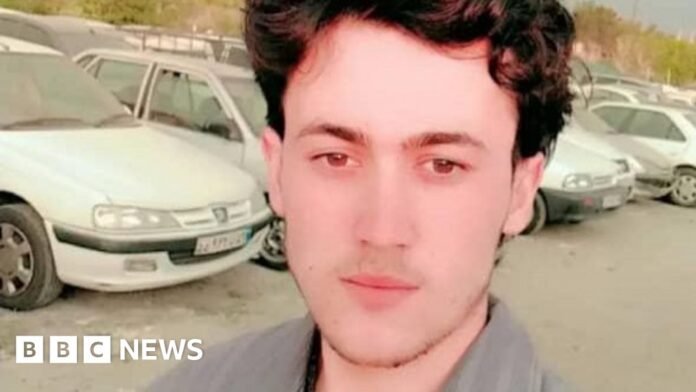“He wasn’t a politician, he was just a teenager, working hard to support our family back home,” Abdul Ghani tells us of his eldest son Abdul Wali, 18, killed in an Israeli strike in Iran.
His father, says that Abdul was working and living in a construction site in north-east Tehran near a military building, when the attack happened on Tuesday.
Though he survived the building collapse, he died a few hours later at a hospital, according to his father.
Abdul was in Iran on a work visa and was the main breadwinner for their family in central Afghanistan.
“I’m injured and can’t work. Abdul wanted to go to university, but he gave up his future, to send money back home,” his father tells us.
He says his son was relying on his managers for advice and they had said the building was safe, given it was a civilian site.
The BBC has not able to verify the details of the incident. Our journalists are unable to report from Iran due restrictions by its government.
But one of Abdul Wali’s relatives sent us a video of the apparent attack, where loud explosions can be heard and men are seen running out of a building amidst smoke and debris. One man is calling out for Abdul Wali, urging him to come outside.
Abdul’s family have accepted they may not be able to return his body home amidst the conflict. “The body is still at the hospital. He may have to be buried in Iran, at least it’s an Islamic country.”
Abdul’s death has shocked Afghans inside and outside of Iran. There are some 4.5 million Afghan nationals in the country, according to the UN.
One person told the BBC they are urging their loved ones to come back to Afghanistan, despite their financial struggles, telling them “working in Iran is not worth losing your life”.
WhatsApp groups seen by the BBC are regularly sharing news about the conflict from Afghan outlets, as people inside Iran complain about a lack of information from state media.
Despite internet outages across the country, they are also trying to offer each other comfort and support. As the conflict enters its sixth day, one Afghan in Mashhad, in north-eastern Iran, tells us there is a persistent worry in messages, with people saying: “If this continues, where will we go?”
We have spoken to several Afghans across Iran who have described sleepless nights, watching missiles “fall from the sky”, and the fear the next explosion will be closer than the last.
They are no stranger to hardship nor conflict. Unlike Abdul, most of the Afghans we have spoken to fled after the Taliban seized control of their homeland in 2021. Yet, they are still overwhelmed by what they are witnessing.
We are not using their real names, as they fear doing so would either put their residency in Iran in jeopardy, or risk reprisal from the Taliban government.
“There was a strike just a few kilometres away from our home in Mashhad. It feels like the city has shut down. Any feeling of safety we had has been destroyed,” Fereshteh tells us.
She used to work for an American non-profit that advocated for women’s rights in Afghanistan, and fled three years ago. She believes that makes her a known target of the Taliban government, who have imposed increasing restrictions on women’s ability to learn, work, dress and travel.
“It’s a really dangerous situation, but whether we leave Iran or go back to Afghanistan, we’ll still be in danger,” Fereshteh says.
While the Taliban government has previously told the BBC that all Afghans can “live in the country without any fear”, a UN report in 2023 cast doubt on a general amnesty.
Fereshteh is terrified of returning, even if that means staying in Iran while it is under attack. But still, she pleads, saying: “We need help.”






